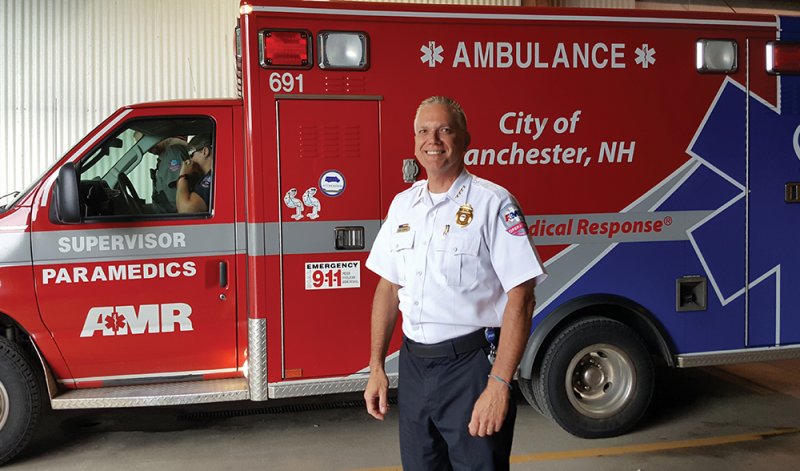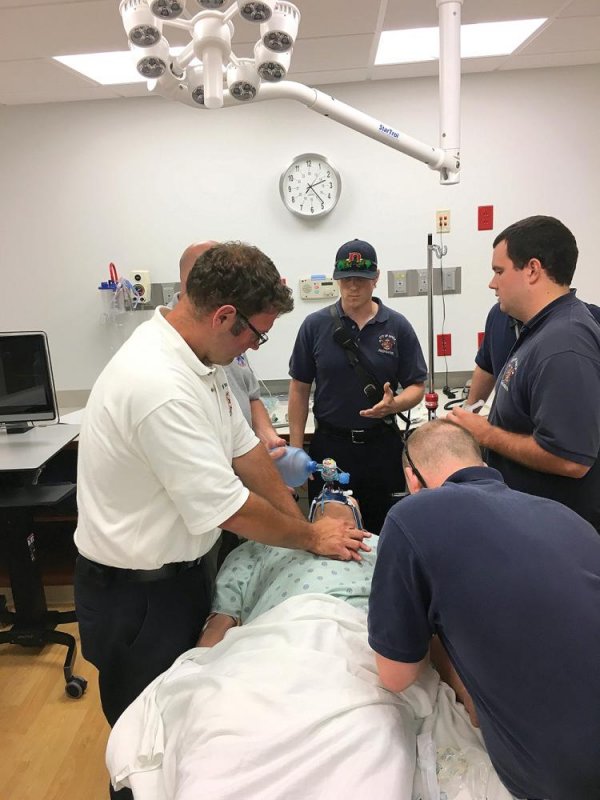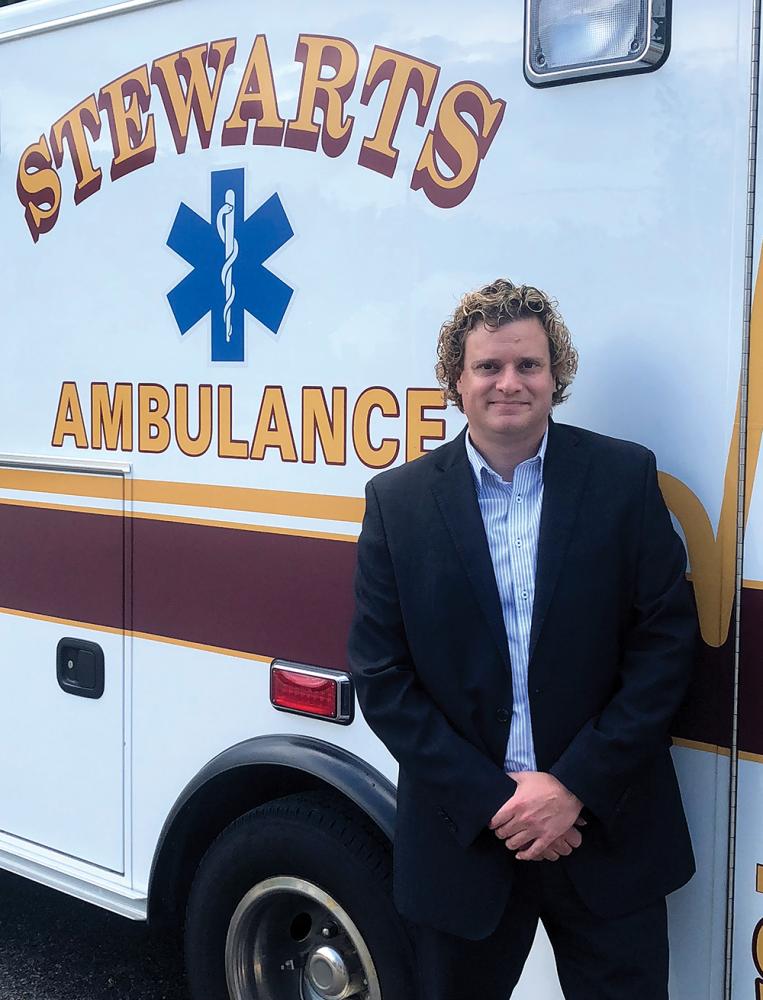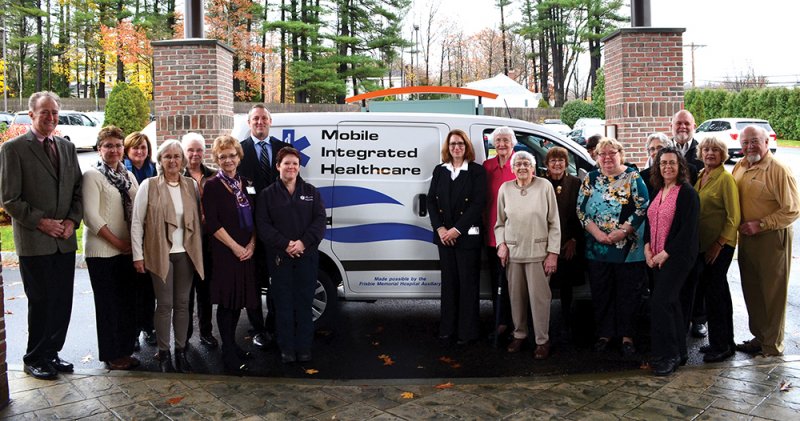
Courtesy of Dover Fire and Rescue.
Among the state’s biggest health challenges are the raging opioid crisis and the lack of resources for mental health needs, especially for those who are homeless. And on the front lines addressing these issues are ambulance crews.
The 911 responders are the first health care providers on the scene for potential overdoses, are the default primary care provider to the homeless, and often the most public-facing part of the heath care community. Working in the field gives emergency medical service (EMS) providers a deep knowledge of the most vulnerable segments of the population and enables out-of-the-box thinking to help solve some of the state’s most difficult health care issues.
In recent years, EMS providers and the state have developed ways to use mobile integrated health care to create pilot programs that address unmet community health care needs in the field.
Nick Mercuri, chief of strategy and planning for the NH Division of Fire Standards and Training and Emergency Medical Services, says these pilot programs use emergency medical services in a new way.
“It is using us to try to prevent the next emergency call. The classic scenario is that we respond, but we don’t prevent,” Mercuri says, explaining emergency responders could do more than respond to emergencies. They could prevent them.
The state has approved eight pilot programs so far. Some are focused on lowering hospital admissions for congestive heart failure and chronic obstructive pulmonary disease (COPD); one involves a mobile crisis team to divert appropriate patients away from emergency departments; and another seeks to reduce readmission rates and provide safety assessments in patients’ homes.
Those efforts will be enhanced by $119,297 in federal grants the National Alliance on Mental Illness-NH received in September from the Department of Health and Human Services to fund crisis intervention training for NH’s first responders.
Taking On the Drug Crisis
The first pilot program approved by the state was the Safe Station protocol, which is intended to create a safe place where someone dealing with substance misuse and seeking recovery can come to a participating fire station and ask for help. The firefighters on duty provide a medical assessment, and if there is cause for concern, they call in EMS. The program also offers an alternative to hospital emergency departments for those who may not need immediate medical attention, but need immediate help to start recovery.
Chris Stawasz, regional director for American Medical Response (AMR), which has emergency response contracts with Manchester, Nashua and Candia, says he’s been in the industry for almost 30 years and has never seen anything like the current drug crisis.

Chris Stawasz, regional director for American Medical Response. Courtesy photo.
“Manchester is ground zero for the opioid crisis,” Stawasz says. “Last year we had 877 overdoses and 67 of those were fatal. If 67 people died of car accidents, the public outcry would be huge for traffic studies and more policing,” he says. “Our typical overdose case is a 25- to 30-year-old male who has been to college; but overall this crisis doesn’t discriminate. The power of this drug is unexplainable; it gets you hooked and it won’t let go.”
But Stawasz says they are making headway. Year to date, Manchester’s fatality rate decreased 26 percent, and overdoses are down 12 percent. “It had been increasing by double digits, so that’s progress,” Stawasz says. Meanwhile, more than 4,000 people have taken advantage of Safe Station in Manchester since it launched in 2016.
Strafford County has also been particularly hard hit by the opioid crisis and has the highest rate of Narcan (the overdose reversal drug) administration, according to state figures. In Dover, the largest city in the county, Fire Chief Eric Hagman says his department has responded to more than 400 overdoses in 10 years. The city joined a lawsuit against the opioid manufactures, marketers and distribution companies. Dover also has the Safe Station program in place, called Community Access to Recovery, an effort led by the Dover Police Department.
Last year, the NH Department of Safety received a federal grant to allow EMTs to make a return visit to a home where an overdose occurred. According to Mercuri, they will provide CPR training, Narcan and information about treatment and recovery services. “If we can train an individual’s family or support network, they can provide help even before the EMTs arrive,” Mercuri says.
Breaking Down Barriers
Stawasz says the crisis has helped break down silos in health care, an important change since the issues of substance abuse, mental health and homelessness are so intertwined. He says for many of their patients AMR is the primary care provider. “The homeless have no PCP; if something goes wrong, they call 911,” Stawasz says. “Half of our business model is mental health issues.”
Knocking down silos means finding new ways for emergency responders to help patients. Stawasz says AMR will be working with a local hospital on a plan aimed at preventing re-admission for congestive heart failure. The plan would call for paramedics to visit patients at home after they have been discharged to make sure they are following the doctor’s instructions. “By working with a cardiologist and having our paramedics go out into the field, we can help keep people out of the hospital and on a steady path back to good health,” he says.
Stawasz says as AMR starts to look at other types of mobile integrated health care plans, the real advantage is sending a paramedic in to treat the issue rather than the old model of stabilizing for transport. “It’s someone who’s well-qualified and can do whatever might be needed,” he says. “All the while, the patient is at home rather than in the hospital being treated, where it is more expensive and they could be exposed to other illnesses.”
No Stable Funding
Hagman wants to see more of these programs in Dover. “The idea is to treat people or guide people with their medical care before needing an ambulance transport, or in the period immediately after returning home from the hospital,” he says. Hagman says the issue at the moment is funding and finding the required partnership with a local hospital and/or Visiting Nursing Association.

Dover Fire Department staff participate in EMS training at Wentworth-Douglass Hospital’s simulation center. Courtesy photo.
Most mobile integrated health plans are funded through insurance carrier grants, Hagman says, and Dover has not been able to tap into the right one. There is also no payment or billing stream where an ambulance crew doing mobile integrated work can bill an insurance company and be paid. “We are simply trying to get the pieces to fall into place. We all see mobile healthcare as the next way to serve the citizens in Dover,” Hagman says.
Scott Schuler, regional director of operations for Transformative Healthcare, says while his organization has not submitted a mobile health care proposal, it is looking into it as part of a larger examination of finding the best way to deliver care. Transformative runs Stewarts Ambulance Service in the Lakes Region; Lifeline, which serves Concord Hospital, Exeter Hospital and Southern NH Hospital in Nashua; and Fallon Ambulance Service in Massachusetts.

Scott Schuler, regional director of operations for Transformative Healthcare. Courtesy of Lifeline.
“We are very interested in looking at the New England market and finding a sustainable model,” Schuler says. “There are major changes going on around the country, but there are very few programs that are financially sustainable models without some sort of grant funding. They are doing well, and with mobile integrated health care you can immediately see the cost savings. But it’s a little more difficult tracking patients over a 30- to 90-day window” due to the complexities of managing multiple health records from different medical facilities.
Gary Brock, director of EMS and emergency preparedness at Frisbie Memorial Hospital EMS, a unit of Frisbie Memorial Hospital in Rochester, says Frisbie has a history of piloting initiatives, including being the first hospital-based paramedic service in New England.
Among Frisbie’s current initiatives is a mobile integrated health program that helps people who frequently visit the emergency room for chronic medical conditions to manage their care more effectively, Brock says. That requires coordination among health care providers and agencies.

Frisbie Memorial Hospital’s Mobile Integrated Health Program. Courtesy photo.
“The success of a system is contingent on the integration with existing services; relationships with community public health centers, visiting nurse organizations, medical specialists and primary care providers; and ensuring that patients are obtaining the right services [that integrate directly with] most of the system,” Brock says.
He explains that heart attacks, sepsis and COPD are three of the top killers in the greater Rochester area, and northern Strafford County has been identified as one of the sickest populations in NH. The region is also plagued by an opioid epidemic that has been unrelenting despite efforts made thus far, he says. As a hospital-based ambulance and mobile integrated health program, Brock says it ensures hospital-level oversight and advancements in treatment.
Brock says Frisbie’s mobile integrated health program is in the third year of a four-year pilot, and the NH Department of Health and Human Services is preparing to introduce the program into permanent rule that all EMS providers would be able to adopt. The hospital funded two years of the pilot program, with the other two funded by grants.
“There has been success in obtaining reimbursements from insurers in other states, and we will seek to have the same for New Hampshire after the program becomes permanent rule,” he says. Typically, treatment by emergency responders is not covered if the patient is not taken to a hospital.
This year, Anthem Blue Cross and Blue Shield in NH began reimbursing EMS providers in certain instances for providing care to consumers without transporting them to a hospital. According to Stephanie DuBois, director of public relations, it is “part of our continuing efforts to collaborate with providers to make health care simpler, more affordable and more accessible. We value the relationship we have with health care professionals and recognize that we can work together to improve the health care system for consumers.”
Mercuri says additional funding through a Substance Abuse and Mental Health Services Administration grant has been approved, and he anticipates the number of plans to double in the next year because of the federal grants.

 Current Issue - April 2024
Current Issue - April 2024